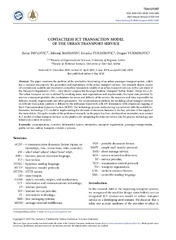Please use this identifier to cite or link to this item:
https://rfos.fon.bg.ac.rs/handle/123456789/2081Full metadata record
| DC Field | Value | Language |
|---|---|---|
| dc.creator | Pavlović, Zoran | |
| dc.creator | Banjanin, Milorad | |
| dc.creator | Vukmirović, Jovanka | |
| dc.creator | Vukmirović, Dragan | |
| dc.date.accessioned | 2023-05-12T11:28:57Z | - |
| dc.date.available | 2023-05-12T11:28:57Z | - |
| dc.date.issued | 2020 | |
| dc.identifier.issn | 1648-4142 | |
| dc.identifier.uri | https://rfos.fon.bg.ac.rs/handle/123456789/2081 | - |
| dc.description.abstract | The paper examines the problem of the productive functioning of an urban passenger transport system, which has a modular structure for the generation and exploitation of the urban transport services. The research objects consist of conventional, scalable and innovative contactless transaction models of an urban transport services in the case study of the Transport Organization (TO) - Joint Stock Company for Passenger Railway Transport "Serbia Trains" (Srbija Voz a.d.). The urban transport service is defined by invoking users, user expectations and requirements, the input data provided by users to a transport provider, the mechanisms for access and delivery of the service, the resources and roles responsible for delivery, security requirements and other parameters. The communication platform for modeling urban transport services in different transaction contexts is defined by the utilitarian framework with 6W dimensions with situational mapping of the 6 Communication Dynamics Factors (6CDF). The technology-process restructuring was achieved with the scalable Information Technology (IT) model by implementing the elements of electronic business in the key activities of the supply of the train tickets. Using the results of the performed research, in the paper has been developed an innovative, non-contact ICT model of urban transport services on the platform for integrating the Internet service into the process-technology and behavioral-context structures. | en |
| dc.publisher | Vilnius Gediminas Tech Univ, Vilnius | |
| dc.rights | openAccess | |
| dc.rights.uri | https://creativecommons.org/licenses/by/4.0/ | |
| dc.source | Transport | |
| dc.subject | transport organization | en |
| dc.subject | railway transport | en |
| dc.subject | public service | en |
| dc.subject | passenger transportation | en |
| dc.subject | interaction | en |
| dc.subject | information system | en |
| dc.subject | e-ticket | en |
| dc.subject | e-process | en |
| dc.subject | customer | en |
| dc.subject | communication | en |
| dc.title | Contactless ICT transaction model of the urban transport service | en |
| dc.type | article | |
| dc.rights.license | BY | |
| dc.citation.epage | 510 | |
| dc.citation.issue | 5 | |
| dc.citation.other | 35(5): 500-510 | |
| dc.citation.rank | M23 | |
| dc.citation.spage | 500 | |
| dc.citation.volume | 35 | |
| dc.identifier.doi | 10.3846/transport.2020.12529 | |
| dc.identifier.fulltext | http://prototype2.rcub.bg.ac.rs/bitstream/id/668/2077.pdf | |
| dc.identifier.rcub | conv_2435 | |
| dc.identifier.scopus | 2-s2.0-85098681779 | |
| dc.identifier.wos | 000604437100005 | |
| dc.type.version | publishedVersion | |
| item.cerifentitytype | Publications | - |
| item.fulltext | With Fulltext | - |
| item.grantfulltext | open | - |
| item.openairecristype | http://purl.org/coar/resource_type/c_18cf | - |
| item.openairetype | article | - |
| Appears in Collections: | Radovi istraživača / Researchers’ publications | |
SCOPUSTM
Citations
13
checked on Nov 17, 2025
Page view(s)
12
checked on Dec 28, 2025
Download(s)
4
checked on Dec 28, 2025
Google ScholarTM
Check
Altmetric
This item is licensed under a Creative Commons License


